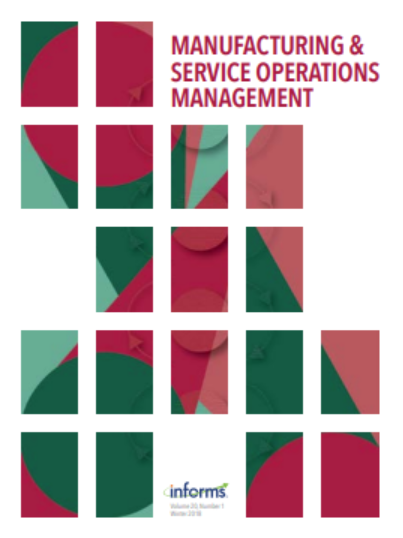迟早?网上零售的交货速度
IF 4.8
3区 管理学
Q1 MANAGEMENT
M&som-Manufacturing & Service Operations Management
Pub Date : 2023-08-01
DOI:10.1287/msom.2021.0174
引用次数: 1
摘要
摘要问题定义:在线零售商必须在客户决定购买之前向他们提供订单交付速度的估计。零售商可以在不改变线下基础设施的情况下战略性地调整这种在线配送速度承诺,这样做可能会从根本上影响业务成果。它可以影响消费者的购买决策和购后体验,通常是相反的方向。一方面,积极的(例如,更快的)交付估计可以确保更多的客户满足他们的最后期限,因此,可能会增加他们的提前购买。另一方面,一个激进的估计倾向于过度承诺,潜在地导致比预期更长的等待时间,这可能会降低客户满意度并增加事后产品退货。在本研究中,我们估计了零售商的交货速度承诺对顾客行为和经营绩效的因果关系。方法/结果:我们与Collage.com(一家在美国销售定制照片产品的在线零售商)合作,在保持实际交付速度不变的情况下,从外部改变在线披露的交付速度估计。使用差异中的差异识别策略,我们发现更快的承诺增加了销售和利润,但它也增加了产品退货并降低了客户保留率。此外,我们提出了一个数据驱动的模型,该模型使用估计的参数来优化交付承诺,以最大化客户生命周期价值。管理启示:我们的研究结果提供了管理见解和数据驱动的政策,零售商可以利用这些政策来优化和定制他们的交付承诺。基金资助:孙涛感谢长江商学院研究院的研究支持。补充材料:在线附录可在https://doi.org/10.1287/msom.2021.0174上获得。本文章由计算机程序翻译,如有差异,请以英文原文为准。
Sooner or Later? Promising Delivery Speed in Online Retail
Abstract. Problem definition: Online retailers have to provide customers with an estimate of how fast an order can be delivered before they decide to make the purchase. Retailers can strategically adjust this delivery speed promise online without changing offline infrastructure, and doing so may fundamentally impact business outcomes. It can influence consumers’ purchasing decisions and postpurchase experiences, often in the opposite direction. On one hand, an aggressive (i.e., faster) delivery estimate could ensure that more customers meet their deadlines and thus, may increase their purchases ex ante. On the other hand, an aggressive estimate tends to overpromise, potentially leading to a longer than expected wait time, which can lower customer satisfaction and increase product returns ex post. In this research, we estimate the causal effect of retailers’ delivery speed promise on customer behaviors and business performance. Methodology/results: Collaborating with Collage.com , an online retailer that sells customized photo products across the United States, we exogenously varied the disclosed delivery speed estimates online while keeping the physical delivery speed unchanged. Using the difference-in-differences identification strategy, we find that a faster promise increases sales and profits, but it also increases product returns and reduces customer retention. In addition, we propose a data-driven model that uses the estimated parameters to optimize delivery promises to maximize customer lifetime value. Managerial implications: Our findings provide managerial insights and a data-driven policy that retailers can leverage to optimize and customize their delivery promises. Funding: T. Sun acknowledges research support from CKGSB Research Institute. Supplemental Material: The online appendix is available at https://doi.org/10.1287/msom.2021.0174 .
求助全文
通过发布文献求助,成功后即可免费获取论文全文。
去求助
来源期刊

M&som-Manufacturing & Service Operations Management
管理科学-运筹学与管理科学
CiteScore
9.30
自引率
12.70%
发文量
184
审稿时长
12 months
期刊介绍:
M&SOM is the INFORMS journal for operations management. The purpose of the journal is to publish high-impact manuscripts that report relevant research on important problems in operations management (OM). The field of OM is the study of the innovative or traditional processes for the design, procurement, production, delivery, and recovery of goods and services. OM research entails the control, planning, design, and improvement of these processes. This research can be prescriptive, descriptive, or predictive; however, the intent of the research is ultimately to develop some form of enduring knowledge that can lead to more efficient or effective processes for the creation and delivery of goods and services.
M&SOM encourages a variety of methodological approaches to OM research; papers may be theoretical or empirical, analytical or computational, and may be based on a range of established research disciplines. M&SOM encourages contributions in OM across the full spectrum of decision making: strategic, tactical, and operational. Furthermore, the journal supports research that examines pertinent issues at the interfaces between OM and other functional areas.
 求助内容:
求助内容: 应助结果提醒方式:
应助结果提醒方式:


